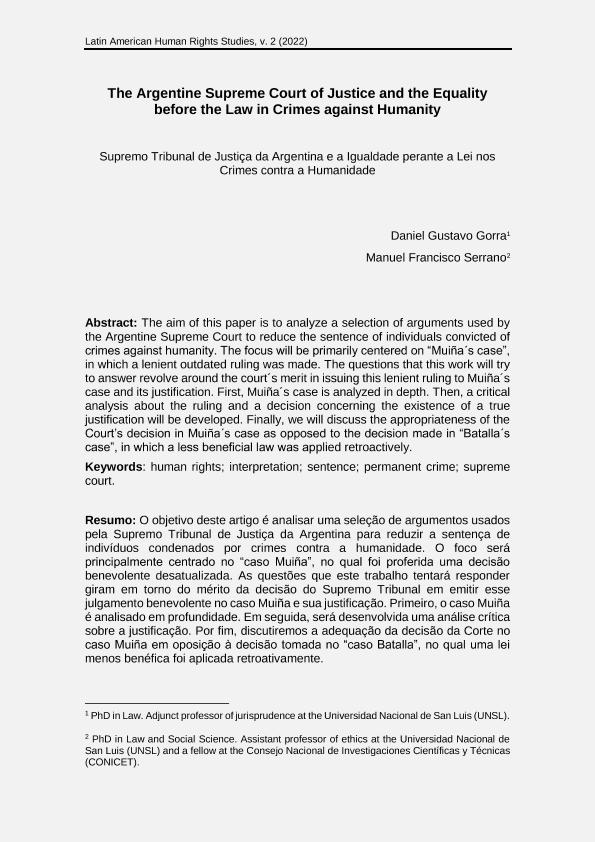Mostrar el registro sencillo del ítem
dc.contributor.author
Gorra, Daniel
dc.contributor.author
Serrano, Manuel Francisco

dc.date.available
2023-12-18T17:55:22Z
dc.date.issued
2022-12
dc.identifier.citation
Gorra, Daniel; Serrano, Manuel Francisco; The Argentine Supreme Court of Justice and the Equality before the Law in Crimes against Humanity; Universidade Federal de Goiás; Latin American Human Rights Studies; 2; 12-2022; 1-28
dc.identifier.uri
http://hdl.handle.net/11336/220666
dc.description.abstract
The aim of this paper is to analyze a selection of arguments used by the Argentine Supreme Court to reduce the sentence of individuals convicted of crimes against humanity. The focus will be primarily centered on “Muiña´s case”, in which a lenient outdated ruling was made. The questions that this work will try to answer revolve around the court´s merit in issuing this lenient ruling to Muiña´s case and its justification. First, Muiña´s case is analyzed in depth. Then, a critical analysis about the ruling and a decision concerning the existence of a true justification will be developed. Finally, we will discuss the appropriateness of the Court’s decision in Muiña´s case as opposed to the decision made in “Batalla´s case”, in which a less beneficial law was applied retroactively.
dc.description.abstract
O objetivo deste artigo é analisar uma seleção de argumentos usados pela Supremo Tribunal de Justiça da Argentina para reduzir a sentença de indivíduos condenados por crimes contra a humanidade. O foco será principalmente centrado no “caso Muiña”, no qual foi proferida uma decisão benevolente desatualizada. As questões que este trabalho tentará responder giram em torno do mérito da decisão do Supremo Tribunal em emitir esse julgamento benevolente no caso Muiña e sua justificação. Primeiro, o caso Muiña é analisado em profundidade. Em seguida, será desenvolvida uma análise crítica sobre a justificação. Por fim, discutiremos a adequação da decisão da Corte no caso Muiña em oposição à decisão tomada no “caso Batalla”, no qual uma lei menos benéfica foi aplicada retroativamente.
dc.format
application/pdf
dc.language.iso
eng
dc.publisher
Universidade Federal de Goiás
dc.rights
info:eu-repo/semantics/openAccess
dc.rights.uri
https://creativecommons.org/licenses/by/2.5/ar/
dc.subject
HUMAN RIGHTS
dc.subject
INTERPRETATION
dc.subject
SENTENCE
dc.subject
PERMANENT CRIME
dc.subject.classification
Otras Derecho

dc.subject.classification
Derecho

dc.subject.classification
CIENCIAS SOCIALES

dc.title
The Argentine Supreme Court of Justice and the Equality before the Law in Crimes against Humanity
dc.title
Supremo Tribunal de Justiça da Argentina e a Igualdade perante a Lei nos Crimes contra a Humanidade
dc.type
info:eu-repo/semantics/article
dc.type
info:ar-repo/semantics/artículo
dc.type
info:eu-repo/semantics/publishedVersion
dc.date.updated
2023-12-18T11:58:17Z
dc.identifier.eissn
2763-8162
dc.journal.volume
2
dc.journal.pagination
1-28
dc.journal.pais
Brasil

dc.journal.ciudad
Goiânia
dc.description.fil
Fil: Gorra, Daniel. Universidad Nacional de San Luis; Argentina
dc.description.fil
Fil: Serrano, Manuel Francisco. Instituto de Investigacion En Ciencias Humanas y Sociales (iichs) ; Facultad de Cs.humanas ; Universidad Nacional de San Luis; . Consejo Nacional de Investigaciones Científicas y Técnicas. Centro Científico Tecnológico Conicet - San Luis; Argentina
dc.journal.title
Latin American Human Rights Studies
dc.relation.alternativeid
info:eu-repo/semantics/altIdentifier/url/https://revistas.ufg.br/lahrs/article/view/77983
Archivos asociados
